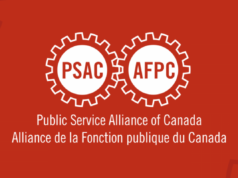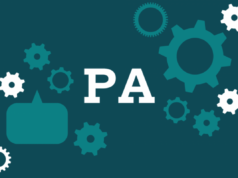PSAC has announced that Treasury Board and Canada Revenue Agency units are set to strike on April 19 if a deal isn’t reached by 9 p.m. ET on April 18.
We know that our members have questions about the strike process, so please take time to review the PSAC Treasury Board strike FAQ, as it is frequently updated with new content, including important information on:
- What to do in the event of a strike
- Where to report to join a picket line
- The consequences of crossing a picket line for striking workers
- The consequences of continuing to work, even remotely, for workers in non-essential positions
- What to do if you’re travelling for work
- What to do if you’re on an acting assignment
- Etc.
Workers in non-essential positions: See you on the picket line!
In the event of a strike, workers in non-essential positions must not report to work, including remotely. Once a strike is declared, do not have any communication with your manager unless you are in an essential position (or are asked to return employer equipment). Do not report to your manager, do not take phone calls from work, and do not answer work emails. Don’t cross picket lines — either at a physical office, or by continuing to work from home.
Instead, use the PSAC picket line finder (link to come) and join the nearest picket line. Members who are unable to attend a picket line (due to being farther than 100km from a picket line, or for other reasons) can request an accommodation to perform alternate strike duties by contacting their PSAC regional office.
As per PSAC, members who cross the picket line by performing work for the employer could face fines and suspension of membership privileges. PSAC’s Constitution outlines disciplinary action that can be taken against members, including “a fine that equals the amount of daily renumeration earned by the member, multiplied by the number of days that the member crossed the picket line, performed work for the employer, or voluntarily performed struck work.”
See the PSAC Treasury Board strike FAQ for more information.
Beware of misinformation
We’ve heard from several members about attempts by some managers to spread misinformation about what workers (both essential and non-essential) should do. Whether you’re in an essential or a non-essential position, here are some examples of what your manager might tell you to do, when in reality, you should not do any of the following during a strike:
- Calling in every morning before the time you would normally be starting work
- Attending meetings before the time you would normally be starting work
- Calling/going on MS Teams before your regular start time, under threat of being marked absent and not paid
- Entering your strike leave on a daily basis
- Choosing to work or be on strike
- If non-essential, logging into the work computer for any reason while on strike
- Checking-in with your manager for attendance twice a day
- Picketing for 4 hours but working the rest of the time
- Performing non-essential tasks, or tasks/duties that are not a part of your regular job
- Etc.
If your manager is telling you do to any of the above, they’re telling you to be a scab. Don’t do it.
What you can — and should — do:
- If you’re in an essential position: Report to work and perform essential duties. Support strike efforts outside of your scheduled work period.
- If you’re in a non-essential position: Don’t report to work. You’re on strike. Join (don’t cross) a picket line.
If your manager attempts to share misinformation or tries to intimidate you, make note of it (forward emails to yourself at home, take screenshots of messages, etc.) and send this information to your Branch President and PSAC Regional Office.
For more information, see Treasury Board strike mandate – CIU complementary FAQ and, as always, the PSAC TB strike FAQ.
Some information adapted from content previously published by PSAC.





